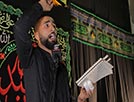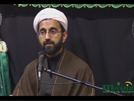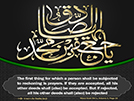
Did you know that both Shiites and Sunnis believe Verse 67 in Chapter Al-Ma’ida has been revealed on Ghadir day and for the sake of Imam Ali’s (A.S) guardianship (walaya)?
Shiite: Usul Kafi, Vol. 1, P 290
Sunni: Shavahed at-Tanzil, Vol. 1, Hadith 249
* * *
Did you know that both Shiites and Sunnis believe Verse 55 in Chapter Al-Ma’ida regards Imam Ali’s (A.S) ring donation during prayers and obliges acceptance of his guardianship (walaya)?
Shiite: Noor al-Thaghalain (tafsir), verse interpretation
Sunni: Ibn Kathir’s Tafsir, verse interpretation
* * *
Did you know that Verse 9 in Chapter An-Nisa urges everyone to obey Imam Ali (A.S) and the other Imams (A.S)?
Shiite: Kamal ad-Din, Vol. 1, Pg 222
Sunni: Shavahed Tanzil, Vol. 1, Hadith 202
* * *
Did you know that, according to Verse 3 in Chapter Al-Ma’ida, one’s faith is completed by accepting Ghadir and Imam Ali’s (A.S) successorship?
Shiite: Usul Kafi, Vol. 1, Pg 290
Sunni: Shavahed at-Tanzil, Vol. 1, Hadith 211
* * *
Did you know that both Shiites and Sunnis believe Verse 7 in Chapter al-Bayyina is about Imam Ali’s (A.S) guardianship and that he is the best benefactor?
Shiite: Al-Burhan (tafsir), verse interpretation
Sunni: Dur al-Manthur, verse interpretation
* * *
Did you know that both Shiites and Sunnis agree Verse 7 in Chapter Al-Ra’d introduce Imam Ali (A.S) as the best guide and director for Muslims?
Shiite: Al-Burhan (tafsir), verse interpretation
Sunni: Musnad Ahmad, Chapter 2, Hadith 990
* * *
Did you know that Verse 7 in Chapter Al-Anbiya suggests Imam Ali and other Imams (A.S) the meaning of “those who reminisce (possess) the Message?”
Shiite: Tafsir Saafi, verse interpretation
Sunni: Shavahed at-Tanzil, verse interpretation
* * *
Did you know that both Shiites and Sunnis believe Imam Ali (A.S) possesses full insight of the Holy Quran according to Verse 43 in Chapter Al-Ra’d?
Shiite: Usul Kafi, Vol. 1, P 229
Sunni: Shavahed at-Tanzil, Vol. 1, P 400
* * *
Did you know that “holding fast by the rope Allah (S.W.T) has stretched for you” in Verse 103 in Chapter Al-i-Imran means grasping on belief in Imam Ali’s and other Imam’s (A.S) guardianship?
Shiite: Ghayba No’mani, Chapter 2, Hadith 2
Sunni: Shavahed at-Tanzil, Vol. 1, P 168
* * *
Did you know that both Shiites and Sunnis have identically narrated the famous hadith “Whoever I am his master, this Ali is his master?”
Shiite: Usul Kafi, Vol. 1, P 293 Did you know that Holy Prophet (P.B.U.H&H.P) introduced Imam Ali (A.S) as his successor in his party after the reveal of Verse 214 in Chapter Ash-Shu’ara?
Shiite: Al-Burhan (tafsir), verse interpretation
Sunni: Musnad Ahmad Hanbal, Chapter 39, P 297, Hadith 18497
* * *
Did you know that Holy Prophet (P.B.U.H&H.P) told Imam Ali (A.S) that, “Your position to me is like Aaron’s to Moses?”
Shiite: Ershad Mofid, Vol. 1, Pg 8
Sunni: Sahih Bukhari, Chapter 13, Hadith 4064
* * *
Did you know that Holy Prophet (P.B.U.H&H.P) has said, “Ali is of me and I am of him; and he is the guardian of the faithful?”
Shiite: Managheb Shahr-Ashoob, Vol. 3, P 51
Sunni: Sunan Tirmizi, Chapter 12, Number 3653
* * *
Did you know that Holy Prophet (P.B.U.H&H.P) mentioned, “My successors (imams) are only 12 ones?”
Shiite: Uyun Akhbar al-Reda, Vol. 1, Pg 64, Hadith 31
Sunni: Sahih Moslem, Vol. 9, Al-Amaarah, Hadith 3393
* * *
Did you know that Holy Prophet (P.B.U.H&H.P) said, “One who passes away while does not know the Imam of his time dies as those in the Jahiliyya era?”
Shiite: Usul Kafi, Vol. 1, Chapter ‘Ma Yajibo Ala an-Nas (What people are obligated to do), Hadith 2
Sunni: Musnad Ahmad, Chapter 34, Hadith 16271
* * *
Did you know that Holy Prophet (P.B.U.H&H.P) said, “I pass away while I leave two invaluable evocations: Quran and my family (Itra)?”
Shiite: Vasayel ush-Shia, Hadith 33144
Sunni: Sahih Moslem, Chapter 12, Number 4425
* * *
Did you know that Holy Prophet (P.B.U.H&H.P) said, “I am the capital of insight and Ali is its portal?”
Shiite: Kamal ad-Din, Vol. 1, Chapter 22, P 241
Sunni: Mustadrak Hakim al-Nishaburi, Chapter 10, Number 4614
* * *
Did you know that Holy Prophet (P.B.U.H&H.P) said, “Ali is with the truth and the truth is with Ali?”
Shiite: Khesal Sadugh, Chapter 2, P 496
Sunni: Tarikh Baghdad, Chapter 6, (the story of who whose name is Yousef), P 312
Taken from: Imam Reza.Network
 The commander of the faithful (A.S) - Islam Guidance
The commander of the faithful (A.S) - Islam Guidance









